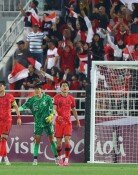Opposition coalition should make apology first
Opposition coalition should make apology first
Posted November. 08, 2013 08:02,
The Democratic Party, the Justice Party, independent Representative Ahn Cheol-soo and members of civic and non-governmental groups together are to launch a joint meeting for the investigation in state agencys election meddling and recovery of democratic and constitutional order. The joint meeting, so-called new opposition coalition, is a reunion of the members of the opposition coalition that was formed for the general and presidential elections last year, expect for the absence of the United Progressive Party. The Democratic Party explained that the meeting is a materialized form of the people coalition, which its leader Kim Han-gil suggested to civil society as a measure to reform the National Intelligence Service. Rep. Ahn Cheol-soo also chose to participate in the meeting as the Democratic Party responded that it also shared his idea of introducing special prosecution for the NIS alleged election meddling.
Looking to the members listed for the meeting, including Baek Nak-cheong, the emeritus professor of Seoul National University, Rev. Ham Se-ung, Jeong Hyeon-baek, the co-head of Peoples Solidarity for Participatory Democracy, it seems that the so-called new coalition has not much changed from its previous version. Renowned elder intellectuals organized a roundtable for hope 2013 and victory 2012 during last years presidential election and urged for the coalition of the Democratic Party and United Progressive Party. If the roundtable had not served as a bond connecting the two opposition parties, lawmakers affiliated with the UPP, which is now brought to justice, might not have been elected.
If members of the joint meeting sincerely want to recover democratic and constitutional order, they should first apologize to the Korean people for misleading the opposition and the Korean people in the last general and presidential elections. A significant number of these people still work for the emergency meeting of civil society for investigation in NIS political maneuver and election meddling, and alleged whitewashing, which has led the candlelight rallies since June.
Geum Tae-seob, an aide to Ahn, recently said, As seen in the last presidential election, only joining forces without raising abilities cannot make you reach the goal. Are they going to repeat the same mistake despite the lesson learned? It is hard to understand why the Democratic Party held the hands of those who had led the blinding coalition last year. Although it prepares for the local elections next year, it is questionable how much support the new opposition coalition composed of similar figures and exclusive only of the UPP can draw from the people.
According to the opinion poll conducted by Dong-A Ilbo, 60.1 percent of the Korean people saw the filing for the dissolution of UPP appropriate. And while 73.1 percent wanted NIS reforms, including the ban on NIS intervention in politics, 64.5 percent wanted to strengthen its investigation authority for communist spying cases. This is a testimony to peoples balanced view toward state affairs. The opposition should recognize that the way to win back peoples hearts and minds is to focus on party reforms and public welfare bills rather than to take a political approach.







